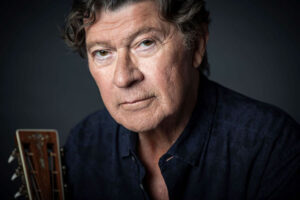
Robbie Robertson was born in Toronto, Ontario in 1943, with roots in both the Mohawk community at the Six Nations Reserve and the Jewish enclave of the city’s downtown. At age 10, he began playing guitar, and in 1960 at the age of 16, he joined drummer Levon Helm in the Hawks, the backing band for rockabilly star Ronnie Hawkins. He received his rock ‘n’ roll education in the Hawks’ line-up, which along with Helm would eventually include future Bandmates Rick Danko, Richard Manuel, and Garth Hudson. Robertson’s unique guitar style on songs such as “Who Do You Love” ushered in an era of classic bluesy rock and influenced numerous musicians.
The Hawks went on to play with Bob Dylan on his legendary “Going Electric” tours in 1965 and 1966. Moving to Woodstock in 1967, Robertson and his bandmates recorded the seminal “basement tapes” with Dylan before changing their name to The Band and releasing the groundbreaking Music from Big Pink album in 1968. The album marked a watershed in rock history, boasting the Robertson-penned classic “The Weight.”
In 1969, The Band performed at the Woodstock Festival before releasing an eponymous album that included the Robertson-composed “Up On Cripple Creek” and “The Night They Drove Old Dixie Down.” The Band became the first North American rock group to appear on the cover of Time magazine.
Stage Fright (1970) with the title track and “The Shape I’m In,” Cahoots (1971) with “Life Is A Carnival,” and the double live set Rock Of Ages (1972) followed. In 1973, The Band performed before the largest rock concert audience in history (an estimated 650,000 people) at the Watkins Glen Festival in New York.
1974 saw the release of the retro collection Moondog Matinee and, after backing Dylan on Planet Waves, The Band co-headlined and backed him on a much-heralded reunion tour which resulted in Before The Flood. The Band’s 1975 album Northern Lights – Southern Cross, which included “Ophelia” and “It Makes No Difference,” followed.
In 1976, The Band bade farewell to live performing with the gala “The Last Waltz” concert on Thanksgiving night. Guests such as Dylan, Eric Clapton, Muddy Waters, Van Morrison, Neil Young and Joni Mitchell joined the group at San Francisco’s Winterland. The concert film, directed by Martin Scorsese, and a three-record box set, were released in 1978 and are considered landmarks in each medium.
Islands (1977) was The Band’s seventh and final studio album with Robertson. He then produced Neil Diamond’s Love At The Greek live album (the previous year he helmed Diamond’s Beautiful Noise).
Long fascinated with film, Robertson co-wrote, produced, appeared in and composed the source music for Carny (1979), starring Gary Busey and Jodie Foster. One of the first rock ‘n’ rollers to seriously engage movie music, he followed up by creating and producing music for Scorsese’s Raging Bull (1980), King Of Comedy (1983), and The Color Of Money (1986), which included “It’s In The Way That You Use It,” co-written with Eric Clapton. For Taylor Hackford’s film saluting Chuck Berry, Hail, Hail Rock & Roll, he was enlisted as creative consultant.
Robertson made his solo album debut in 1987 with his self-titled album, featuring guests Peter Gabriel and U2 and the track “Somewhere Down The Crazy River.” Certified gold and Grammy®-nominated, the album swept up several Juno Awards in his native Canada. When The Band was inducted into the Juno Hall Of Fame, he reunited with the group for an awards ceremony performance.
His second solo album, Storyville (1991), featured some of New Orleans’ most respected musicians and earned two more Grammy nominations. Meanwhile, his “Broken Arrow” became a major hit for Rod Stewart.
In 1994, The Band was inducted into the Rock and Roll Hall of Fame and performed live at the ceremony. On the film front, Robertson scored Barry Levinson’s Jimmy Hollywood and acted in The Crossing Guard, starring Jack Nicholson and directed by Sean Penn. On record, Music For “The Native Americans” from Robbie Robertson & The Red Road Ensemble contained songs from the soundtrack to the highly regarded television miniseries.
Robertson continued his multimedia activities in 1995 by producing the soundtrack album for Scorsese’s Casino and being the subject of Going Home, a Disney Channel documentary highlighting his revisiting the moments, people and places of his musical past.
In 1997, executive soundtrack producer Robertson heard a demo of “Change The World” and sent it to Clapton as a suggestion for Phenomenon, starring John Travolta. He enlisted Babyface to produce and “Change The World” won Grammys for Song of the Year and Record of the Year. Robertson also received a prestigious Lifetime Achievement Award from the National Academy of Songwriters.
Released in 1998, his fourth solo album, the Grammy-nominated Contact From The Underworld Of Redboy, inspired the one-hour PBS documentary Robbie Robertson: Making A Noise. The documentary took viewers along on his journey back to the Six Nations Reservation, where his mother was born and raised and where Robertson spent his summers first learning to play guitar.
Robertson has since scored, consulted for, produced or supervised music for numerous films, including American Beauty (1999), Any Given Sunday (1999) Gangs Of New York (2002), The Departed (2006), Shutter Island (2009), The Wolf of Wall Street (2013), and Silence (2016).
In 2008, The Band was honored with the Recording Academy’s Lifetime Achievement Grammy Award. In Canada, Robertson has won several Juno Awards, been honored twice by Canada’s Walk of Fame, been inducted into the Canadian Songwriters’ Hall of Fame, made an Officer of the Order of Canada, and received the Governor General’s Performing Arts Award.
For his fifth solo album, 2011’s How To Become Clairvoyant, Robertson again collaborated extensively with Eric Clapton, as well as keyboards great Steve Winwood and a new generation of guitar heroes, from Tom Morello (Rage Against The Machine, Audioslave) and Robert Randolph to Nine Inch Nails innovator Trent Reznor. Robertson also enlisted an array of unique vocalists to accompany him, including Clapton, Angela McCluskey, Dana Glover, Rocco DeLuca, and Taylor Goldsmith.
In 2016, Robertson penned the New York Times bestselling memoir, Testimony. A documentary feature film based on the book and titled Once Were Brothers: Robbie Robertson And The Band, premiered at 2019’s Toronto International Film Festival and is streaming on Hulu. The film blends rare archival footage, animation, and the participation of many of Robertson’s friends and collaborators, including Bruce Springsteen, Eric Clapton, Van Morrison, Martin Scorsese, Taj Mahal, Peter Gabriel,David Geffen, and Ronnie Hawkins, among others.
In 2019, Robertson released his sixth solo studio album Sinematic. His work with Scorsese continued with his original score for The Irishman.
Before his death in August 2023, Robertson was writing his follow-up memoir to Testimony, and had just finished scoring the music for Scorsese’s Killers of The Flower Moon starring Leonardo DiCaprio and Robert DeNiro, which was released on October 20, 2023.
photo credit: Don Dixon
